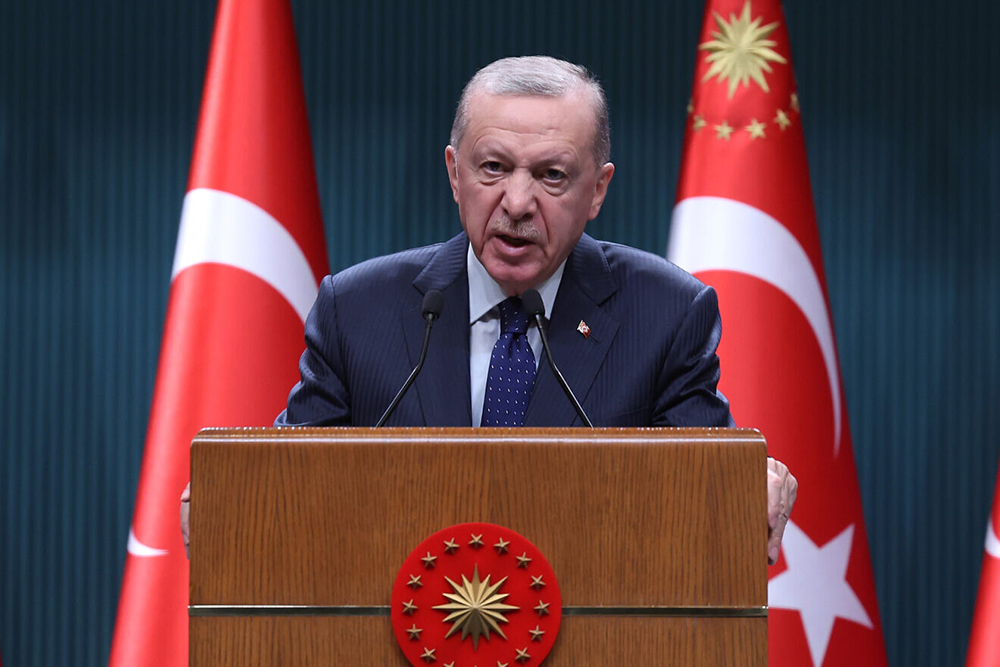|
Getting your Trinity Audio player ready...
|
Their differing ambitions—revival of the Ottoman Empire vs. restoration of the Umayyad Caliphate—place them on a potential collision course.
By: Harold Rhode
Turkey’s President Recep Tayyip Erdoğan is encountering significant difficulties with Abu Muhammad al-Julani and his forces in Syria. In a familiar Middle Eastern pattern, Erdoğan had initially supported Julani’s group, providing training, arms, uniforms and resources. Yet this relationship, born of strategic necessity, is now fraught with tension.
Lessons from Erdoğan’s past
Erdoğan’s strategy with Julani reflects lessons he learned from Turkey’s political history. During the 1990s, his mentor, former Turkish Prime Minister Necmettin Erbakan, attempted to “re-Islamify” Turkey, provoking a strong reaction from the secularist military.
At the time, the Turkish military adhered to Mustafa Kemal Atatürk’s principle of maintaining a secular state. The backlash against Erbakan’s rapid reforms served as a cautionary tale for Erdoğan, who concluded that Islamization must be pursued gradually to avoid provoking opposition.
This philosophy influenced Erdoğan’s broader regional approach. When Islamist leaders came to power in other countries, Erdoğan consistently advised them to advance their agendas slowly to avoid the fate of his mentor.
Erdoğan’s advice rejected
Two examples illustrate the outcomes of Erdoğan’s counsel, or lack thereof.
Egypt’s Mohamed Morsi (2012-2013): After Morsi’s election as Egypt’s president, Erdoğan rushed to Cairo to advise the new leader to avoid imposing Sharia law too quickly, warning that this would provoke a military coup. Morsi and his supporters dismissed Erdoğan’s advice, pushing their Islamist agenda rapidly. Within a year, Morsi was overthrown by Egypt’s military, leading to his imprisonment and eventual death in custody.
Abu Muhammad al-Julani: As the leader of a Sunni radical coalition in Syria, Julani appeared to adopt Erdoğan’s guidance on moderation, at least superficially. Over the years, al-Julani shifted his rhetoric and public image, claiming to have abandoned his Islamist extremism. His wardrobe evolved from traditional Islamist attire to Western suits, signaling a supposed shift in ideology. However, his forces continued to act with brutality against non-Sunni populations, casting doubt on his claimed transformation.
Violence against non-Sunni groups
Despite his moderated public image, al-Julani’s forces have carried out atrocities against Christians, Alawites and Druze populations in Syria.
Christians: Al-Julani addressed a group of Syrian Orthodox priests in a video, claiming that Christians would have rights within the framework of Sharia. The priests’ fearful expressions suggested otherwise; they understood his promise meant relegation to second-class citizenship (dhimmi status). In Christian villages like Maaloula and Jubb’adin, al-Julani’s forces wreaked havoc, demonstrating the reality of life under his rule.
Alawites: Videos show al-Julani’s troops targeting Alawite areas, torturing and slaughtering individuals identified as non-Sunni. Alawite religious sites, such as the shrine of al-Khasibi in Aleppo, have been destroyed. Historically marginalized by Sunni elites, Alawites continue to face violence and persecution under al-Julani’s forces.
Druze: Druze communities, particularly near the Israeli border, remain wary of al-Julani’s forces. Some villages have requested annexation by Israel to escape the uncertainty of Sunni rule. Druze militias have also refused to surrender their arms, fearing retribution under al-Julani’s leadership.
A clash of ambitions
Erdoğan’s support for Julani was partly driven by his desire to weaken the American-backed Kurdish forces in northeastern Syria. These Kurdish fighters, viewed by Erdoğan as allies of the PKK, pose a significant threat to Turkish territorial integrity.
Moreover, Erdoğan fears the demographic shift within Turkey, where the Kurdish birth rate far outpaces that of ethnic Turks, potentially leading to a Kurdish majority within decades.
However, al-Julani has refused Erdoğan’s demands to redirect his forces against the Syrian Kurds, citing exhaustion and overstretched resources. This refusal is a direct affront to Erdoğan, who expected al-Julani to act as an extension of Turkish influence in Syria.
Diverging visions: Damascus vs. Istanbul
Erdoğan’s vision of a neo-Ottoman sphere—with Turkey at its center—clashes with al-Julani’s apparent ambition to restore the Umayyad Caliphate, which historically ruled from Damascus. This ideological divergence underscores a growing rift between the two leaders.
While Turkey’s military is significantly stronger than al-Julani’s forces, logistical challenges and a limited understanding of Syria’s internal dynamics could limit Ankara’s ability to assert control. Al-Julani, meanwhile, benefits from his localized knowledge and ideological appeal among certain Sunni factions.
Conclusion:
The uneasy relationship between Erdoğan and al-Julani reflects broader regional power struggles. Their differing ambitions—the revival of the Ottoman Empire versus the restoration of the Umayyad Caliphate—place them on a potential collision course. Whether this tension will escalate into open conflict or remain a strategic standoff depends on how the situation in Syria evolves.
For now, Erdoğan faces the consequences of empowering an ally whose ambitions may ultimately undermine his own.
(JNS.org)
Harold Rhode received in Ph.D. in Islamic history and later served as the Turkish Desk Officer at the U.S. Department of Defense. He is now a distinguished senior fellow at the Gatestone Institute.




